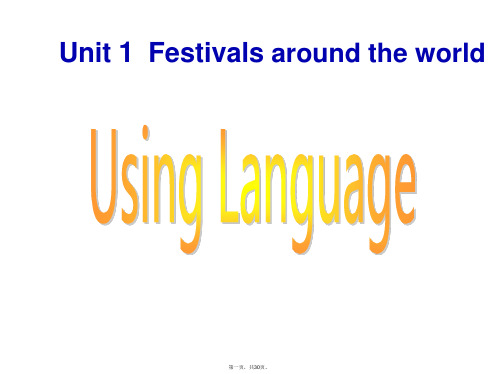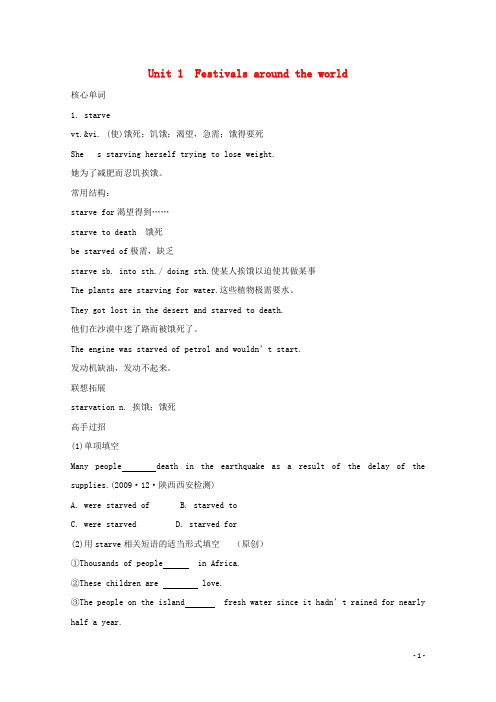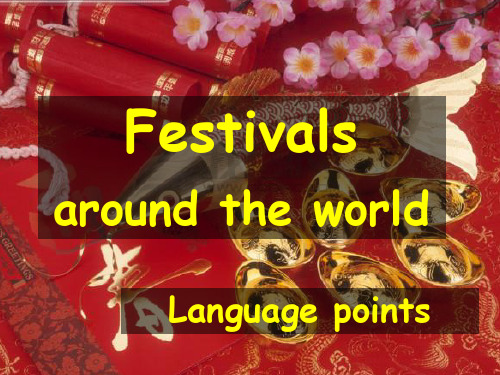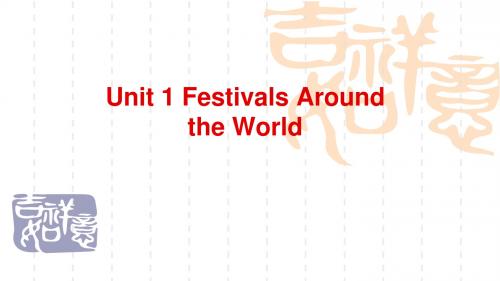人教版新课标高二英语必修三Unit1 Festivals_around_the_world Period2 Festivals and celebrations课件
- 格式:ppt
- 大小:1.86 MB
- 文档页数:19


Unit 1 Festivals around the world核心单词1. starvevt.&vi. (使)饿死;饥饿;渴望,急需;饿得要死She s starving herself trying to lose weight.她为了减肥而忍饥挨饿。
常用结构:starve for渴望得到……starve to death 饿死be starved of极需,缺乏starve sb. into sth./ doing sth.使某人挨饿以迫使其做某事The plants are starving for water.这些植物极需要水。
They got lost in the desert and starved to death.他们在沙漠中迷了路而被饿死了。
The engine was starved of petrol and wouldn’t start.发动机缺油,发动不起来。
联想拓展starvation n. 挨饿;饿死高手过招(1)单项填空Many people death in the earthquake as a result of the delay of the supplies.(2009·12·陕西西安检测)A. were starved ofB. starved toC. were starvedD. starved for(2)用starve相关短语的适当形式填空(原创)①Thousands of people in Africa.②These children are love.③The people on the island fresh water since it hadn’t rained for nearly half a year.解析: (1)选B。
starve to death为固定搭配,意为“饿死”,符合句意。
be starved of与starve for均为“渴望”之意。

![新人教版必修三 Unit 1 Festival around the world[教案]](https://img.taocdn.com/s1/m/98f4ece4763231126fdb1122.png)
第一单元Reading Festivals and celebrations 教案1. 教学设计理念语言的学习离不开文化,英语教学从某种程度上来讲就是文化教学,对英语文化的了解和理解有利于加深本国文化的学习,培养爱国主义精神,也有利于提高人文素养。
因此传授文化知识、培养文化意识和世界意识,是英语教学中一个非常重要的任务。
①运用任务型语言教学模式,训练培养学生对语言的综合运用能力.②课堂以学生为主体,以任务为主线,重视体验参与,教师起到“设计者、研究者、促进者、协调者〞的作用.③在教学中,突出交际性,注重读写的实用性,要进行情感和策略调整,以形成积极的学习态度,促进语言实际运用能力的提高.④正视个体差异,倡导过程鼓励,以多层次、多角度、多主体的结果与过程并重的评价方式鼓励学生进步.2. 教材分析本单元以节日为话题,介绍古今中外节日的种类、由来、意义以及人们的活动和习俗,旨在通过对世界各地的节日名称、由来及庆祝方式的讨论和学习,让学生在多样的东西方节日、文化中进行比拟,并发现节日文化的共性、多样性和民族独特性,从而增进对多种文化节日的理解,进而拓展社会文化背景、增加跨国文化知识.3. 教学目标①帮助学生了解世界各地的节日.②了解节日的分类并进而理解节日庆祝的意义.③通过阅读材料继续训练学生略读,细读,猜想词义,归纳等阅读技巧.4. 重难点①理解节日的起源及意义,增强文化保护意识②通过学生对多样的东西方节日、文化所进行的比拟,发现节日文化的共性、多样性和民族独特性,从而增进对多种文化节日的理解。
5. 教学步骤Unit 1 Festivals around the worldLearning aims : 1.learn about festivals around the world.2. learn about the kinds of festivals and the reason for celebrating them.3. train reading skills such as skimming and summarizing.Difficult points : the reason for peopke’s celebrating festivalsStep 1 Warming up1.What other traditional festivals in China do you know ?______________________________________________________________2.What festivals of foreign countries do you know?______________________________________________________________ Step 2 ReadingII.Careful reading2). Festivals to Honour People (Match the person with the festival.)1. Qu Y uan a. the Dragon Boat Festival2. Christopher Columbus b. an Indian national festival on Oct. 23. Mohandas Gandhi c. Columbus Day3). Harvest Festivals (Choose the best answer.)Many activities can be held in harvest festivals EXCEPT that people ___.A. get together to have mealsB. decorate houses to admire the moonC. win awards for their farm produceD. enjoy mooncakesTask 2 True or False1. The ancient people needn’t worry about their food.2. Halloween used to be a festival to honor the dead.3. Qu Y uan was a great poet who people honor a lot in China.4. Mid-autumn Festival is held to celebrate the end of autumn.5. Easter celebrates the birth of Jesus.Task 3 Answer the questions1.What are festivals of the dead usually for?2. What makes autumn festivals happy events?3. What do people usually do at spring festivals?4. What is one important reason to have festivals and celebrations?III. Free talkingWhat do most festivals seem to have in common ?Step 3 Discussing◆What is your favourite festival? Why?◆When is it? What is the festival about?◆How long can we have for holiday? What do we usually do in the festival? Step 4HomeworkWrite a short passage about your favorite festival。


Festival around the world------(必修3 unit 1 人教新课标)课型:阅读课新授课课时:40mins一,教材分析和教材重组(一)教材分析本单元以节日为话题,介绍了世界各地的一些节日、含义、由来和民俗。
通过本单元的学习,可以帮助学生更多地了解节日、体味文化;同时又能教育学生理解、尊重不同的文化和习俗。
通过本单元的语言技能训练,要求学生学会使用请求以及感谢的表达法。
1. Warming Up 要求学生以小组活动的形式列出中国的节日和这些节日的时间、庆祝的内容以及节日里人们的所作所为。
激发学生的阅读兴趣,为本单元Reading部分的世界节日做好铺垫。
2. Reading 由五篇小短文组成,分别介绍古代节日、亡灵节、纪念名人的节日、丰收节和春天的节日等,使学生了解节日的由来及其存在的意义。
最古老的节日主要庆祝冬天的结束,春天的播种,秋天的收获等。
鬼节是为祭奠亡灵,取悦祖先而举行的节日,例如日本的盂兰盆节(Obon),墨西哥的亡灵节,万圣节(Halloween)等。
纪念名人的节日有中国的端午节,美国的哥伦布日,印度的甘地纪念日。
春天的节日包括中国的春节,西方的狂欢节、复活节,日本的樱花节。
3. Comprehending 第一部分提出的5个问题让学生对所读文章有一个浅层理解。
第二部分要求学生结合所读文章和自己的想法讨论自己最喜欢的节日,教师则呈现一些有用的短语。
(二)教材重组1.将Warming Up,Reading与Comprehending整合在一起上一节“阅读课”。
(三)教学目标:知识与技能:1, Get students to learn new words and expressions in this unit;2, Let students learn to make phone call and invitations and thanks;3, Learn different culture and respect them.4, Develop students’ listening, speaking reading and writing skills.情感目标1, Stimulate students’ love for their own national culture and custom;2, Develop students’ sense of cooperative learning.(四)学情分析:Many students are very familiar with Chinese traditional festivals. They can list many different festivals of our country and foreign countries. According their own experience, I will list many kin ds of different festivals and tell them how to speak them in English.(五)教学重难点教学重点:1, have students learn some useful new words and expression about festivals2, let students learn some reading skills.教学难点:1, let them master the using skill of reading.2, let students learn to write and describe different festivals especially their favorite festival.Part 1: Teaching Design(第一部分:教学设计)Period 1: FESTIVALS AND CELEBRATIONSAims:To help students develop their reading abilityTo help students learn about festivalsProcedures:I. Warming upWarming up by discussingGood morning, class. Today we are going to read about FESTIVALS AND CELEBRATIONS. But first, what kind of festival did we just celebrate? I’d like to hav e you work in groups and list some Chinese festivals that you know. When do they take place? What do they celebrate? And what do people do at that time?Warming up by watchingHi, every one. Nowadays, foreign festivals are more and more popular in China. Can you list some? Look at the photos and let’s see some pictures and guess.Some Western FestivalsValentine’s Day , February 14 情人节April Fool’s Day, April 1 愚人节Mother’s Day 母亲节Father’s Day 父亲节Halloween , October 31 万圣节Easter 复活节Thanksgiving Day 感恩节Labor’s Day 劳动节Christmas Day, December 25 圣诞节II. Pre-reading1. Imagining and sharingHello! Now you can celebrate everyday!Everyday is a holiday. Imagine somewhere someone is celebrating right now. Our world is filled with mystical celebrations and powerful memories. Come and tell the class what holiday it is today.2. Talking and sharingWork in groups of four. Tell your group mates what festivals or celebrations you enjoy in your city or town.However, how do people around the world celebrate their festivals?III. Reading1.Fast readingSkim the reading passage and then fill in the following chart.Festivals Names of Festival CountriesFestivals of theDead2. Careful ReadingNext you are to read and tell your classmates the five sentences true or false.▪The ancient people needn’t worry about their food.▪People celebrate Halloween with a different purpose from the past.▪Gandhi was a great leader who Indian people honor a lot.▪China and Japan share the same custom of celebrating Mid-Autumn Festival.▪Easter just celebrates the rebirth of Jesus.3. ComprehensionUse the information from the passage to answer the questions.1.What are festivals of the dead usually for?2.What makes autumn festivals happy events?3.What do people usually do at spring festivals?4.What is one important reason to have festivals and celebrations?pare the festivals of the dead in Mexico, Japan and China. What things aresimilar? What things are different?IV. DiscussingMy favourite festival◆What is your favourite festival? Why?◆When is it?◆What is the festival about?◆How long can we have it for holiday?◆What do we usually do in the festival?Suggested expressions:I like … festival best. It is celebrated on …. to remember/ in memory of …. It usually lasts … days. People do ….V. Homework1.Listen to your tape and read the text again.2.Try to retell the text with only a few sentences.3.Finish exercises on Page4.。
Unit1 Festivals around the worldTeaching aims:1. TopicFestivals; how festivals begin; how to celebrate festivals2. Useful words and expressions:Starve plenty satisfy ancestor lamp lead feast bone origin trick poet arrival national gain independence gather agricultural European custom award watermelon handsome rooster admire energetic forward Easter clothing religious social Christian daily permission possibility fool apologise drown sadness obvious wipe lovely couple weep announcer forgiveTake place in memory of dress up play a trick look forward to day and night as though have fun with turn up keep one’s word hold one’s breath 3. Functional items:1)RequestCould /Would you please…?Could I have…?Could we look at…?I look forward to ….May I see…?2)ThanksIt’s very kind of you…Thank you very much/thanks a lot.I’d love to.It was a pleasure….Don’t mention it.You are most welcome.4. Structures情态动词can, could, may, might, will, would, shall, should, must, can’t 等的用法。